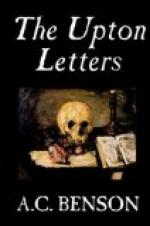I cannot, of course, even dimly realise what has happened; the remoteness of it all, the knowledge that my own outer life is absolutely unchanged, that the days will flow on as usual, makes it trebly difficult to feel what has befallen me. I cannot think of him as dead and silent; yet even before I heard the news, he was buried. I cannot, of course, help feeling that the struggling spirit of my friend tried to fling me, as it were, some last message; or that I suffered with him, and shared his last conscious thought.
Perhaps I shall grow to think of Herbert as dead. But, meanwhile, I am preoccupied with one thought, that such an event ought not to come upon one as such a stunning and trembling shock as it does. It reveals to one the fact of how incomplete one’s philosophy of life is. One ought, I feel, deliberately to reckon with death, and to discount it. It is, after all, the only certain future event in our lives.
And yet we struggle with it, put it away from us, live and plan as though it had no existence; or, if it insistently clouds our thoughts, as it does at intervals, we wait resignedly until the darkness lifts, and until we may resume our vivid interests again.
I do not, of course, mean that it should be a steady, melancholy preoccupation. If we have to die, we are also meant to live; but we ought to combine and co-ordinate the thought of it. It ought to take its place among the other great certainties of life, without weakening our hold upon the activity of existence. How is this possible? For the very terror of death lies not in the sad accidents of mortality, the stiffened and corrupting form, the dim eye, the dreadful pageantry—over that we can triumph; but it is the blank cessation of all that we know of life, the silence of the mind that loved us, the irreparable wound.
Some turn hungrily to Spiritualism to escape from this terrible mystery. But, so far as I have looked into Spiritualism, it seems to me only to have proved that, if any communication has ever been made from beyond the gate of death—and even such supposed phenomena are inextricably intertwined with quackeries and deceits--it is an abnormal and not a normal thing. The scientific evidence for the continuance of personal identity is nil; the only hope lies in the earnest desire of the hungering heart.
The spirit cries out that it dare not, it cannot cease to be. It cannot bear the thought of all the energy and activity of life proceeding in its accustomed course, deeds being done, words being uttered, the problems which the mind pondered being solved, the hopes which the heart cherished being realised—“and I not there.” It is a ghastly obsession to think of all the things that one has loved best—quiet work, the sunset on familiar fields, well-known rooms, dear books, happy talk, fireside intercourse—and one’s own place vacant, one’s possessions dispersed among careless hands, eye and ear and voice




